I have been to Penang many times ever since I took a rumbling bus from Singapore with my buddy TTP, when we were teenagers. I always remembered Penang as a foodie's paradise because of it's wide variety of delicious multicultural street food. So, I was not surprised at all that Lonely Planet picked Penang as top spot in the world for foodies in 2014.
Singapore Blog Award 2014 Winner's Interview with OMY/ My Paper

An excerpt of my interview with OMY was translated into Mandarin and published in My Paper and U Weekly 优1周 UW on 10 Nov 2014.
Here is the full interview in the original English.
1. What do you really blog about?

I blog anything about food and travel that moves me to write and share. Though anchored on the core of food and travel, I am not going to set boundaries for my own space.
Having said that, what moves me are the unfancied and untold.
I love blogging for the underdogs. The unsung food heroes. The untold food and people stories. Hence, Johor hawkers, which was where I started in the beginning. I have been looking for more unheralded food. For example, I am now looking at new immigrant food in Singapore.
2. What do you think is special / unique about your blog, that's different from most other food blogs?

My blog draws widely differing reactions from readers.
A judge in the OMY Blog Awards panel commented that my blog is "full of life and filled with the human touch".
Perhaps, because most of my content is so mundane and familiar, I have to look deeper to find interesting angles to present to the reader.
Find beauty in the ordinary.
3. How much ($) do you spend into running your blog on average each month?

About SGD1,500 a month. Mostly on food and transport. I am using Google's Blogger which is an essentially free platform and hosting service like YouTube which also belongs to Google.
4. Being a food blogger, how do you avoid "eating too much" and putting on weight?

Yeah, I have a extra big challenge. I actually try to eat all the food that I am served instead of just tasting small sampling bites. It's an attitude my mum instilled in us when we were children. It got stuck.
When not food tasting, I try to have simple meals like more oats and fruits. I brisk walk at least an hour a day except when the haze prevents me. Actually, my way of blogging involves a lot of walking. I often park my car and walk around the shop houses, markets and coffee shops to sniff out good food.
5. What are the best and worst experiences you've had in your blogging journey?

At the wedding of Bryan and Sue May
The best experiences is when I am able to make a positive connection with people, and between people.
Hawkers invite me to their homes and introduce me to their families. Sometimes strangers at other tables paid for my meal before I went to settle the bill. Strangers came to say hello. I attend readers' weddings and other private celebrations. Johoreans overseas write to me to tell me my blog keeps them connected with home. Johoreans write to me to tell me that they are discovering their own hometowns through my blog.
Worst experiences are when I got chased away by hawkers, which still happens once in a while.
Social media is a very new phenomenon, so some misunderstandings are inevitable. I myself am quite confused by social media, say just three years ago.
Some hawkers are wary of bloggers because of bad experiences, so their defensive reaction is understandable.
6. How do you deal with the bad experiences, if any?

Too blessed to be stressed
I just remind myself of the objective and social purpose of what I am doing and that always gets me recharged for the next blogging trip. In any case, by far most of my encounters are very heartwarming and positive, so I know that the occasional humps along the journey are just exceptions.
7. What do you wish to see more or less of the blogging community, perhaps especially for the very competitive food scene?
I hope more people realise the possibilities and opportunities blogging and social media create for community service.
For example, I wish more bloggers join me to explore the new cuisine that new immigrants are bringing to our food culture. Yes, create more awareness of the new comfort foods that are entering Singapore's food culture. In this way, food can serve as a bonding tool as it had done before when our forefathers too came to this island from other shores.
Though Singapore probably has the highest density of food bloggers in the world, the voices are not as varied and diverse. I hope there are more trend setters rather than trend followers.
8. Say a few words about winning in Singapore Blog Awards 2014!

Firstly, my gratitude to the hawkers whose stories won the readers' and judges' hearts - I am just a scribe. My heartfelt thanks to my readers in Singapore and overseas for voting for Johor Kaki. I would like to congratulate and thank SBA for playing a crucial role of setting the quality benchmark for blogging in Singapore every year.
Tony
3rd Road 888 Hokkien Mee Lebuh Presgrave in Penang 三條路888福建面
Penang is famous for many good food like Penang char kway teow, Penang asam laksa, Penang curry mee, Penang nasi kandar but many Penangites told me that it's Hokkien mee they turn to for comfort food. You can find Penang Hokkien mee everywhere in Penang at anytime.
Modern day Hokkien mee is a gentrified version of a dish with very humble roots. (Penang Hokkien mee is known as prawn mee in Johor and Singapore.)

I am told by locals that Hokkien mee was created out of bad times. The dish appeared during the Japanese Occupation of Malaya from 1942 to 1945.
During those dark years, too poor to buy the usual ingredients for their food, locals turn to whatever was available at hand.
The local fishermen made stock using discarded prawn heads and shells because the Japanese took all the prawn meat. The dish uses only tiny wild caught sua lor prawns as the bigger meatier prawns always landed on Japanese tables. There were small, thin slices of pork as the fishermen exchanged fish for pork with their equally impoverished pig farmer compatriots. The fishermen threw in a few stems and leaves of crunchy kang kong in the dish as these weeds were abundant in long kangs (drains and canals). The broth and ingredients were eaten with yellow wheat noodles or rice noodles. Fresh chili sauce was used to spice up the dish. Chili was abundant because it was not part of Japanese diet.
Modern day Hokkien mee is a gentrified version of a dish with very humble roots. (Penang Hokkien mee is known as prawn mee in Johor and Singapore.)

I am told by locals that Hokkien mee was created out of bad times. The dish appeared during the Japanese Occupation of Malaya from 1942 to 1945.
During those dark years, too poor to buy the usual ingredients for their food, locals turn to whatever was available at hand.
The local fishermen made stock using discarded prawn heads and shells because the Japanese took all the prawn meat. The dish uses only tiny wild caught sua lor prawns as the bigger meatier prawns always landed on Japanese tables. There were small, thin slices of pork as the fishermen exchanged fish for pork with their equally impoverished pig farmer compatriots. The fishermen threw in a few stems and leaves of crunchy kang kong in the dish as these weeds were abundant in long kangs (drains and canals). The broth and ingredients were eaten with yellow wheat noodles or rice noodles. Fresh chili sauce was used to spice up the dish. Chili was abundant because it was not part of Japanese diet.
Made out of mostly discards, an iconic, wonderfully tasty dish was created out of desperation.
However, authentic aka 1940s Hokkien mee is hard to find even in Penang today.
However, authentic aka 1940s Hokkien mee is hard to find even in Penang today.
This urban legend, of course, is not evidence based though it makes for fun reading 🤭
In Xiamen, China today, there is a dish known as Xiamen Prawn Noodle 厦门虾面 which closely resembles Hokkien mee of Penang. This is likely the predecessor of Penang Hokkien mee.

Irene brought me to this very popular Lebuh Presgrave 888 Hokkien Mee 三條路 888 福建面 near her own old office.

三條路 888 福建面 stall is near the iconic Komtar tower and along the same road as Kwong Wah Yit Poh newspaper.

Step behind the humble push cart stall, and there are plenty of seats.
The Hokkien mee here at 三條路 was indeed superb, though it is far removed from its humble predecessor. 三條路 serves lots of extras, luxuries which appeal to today's customers.
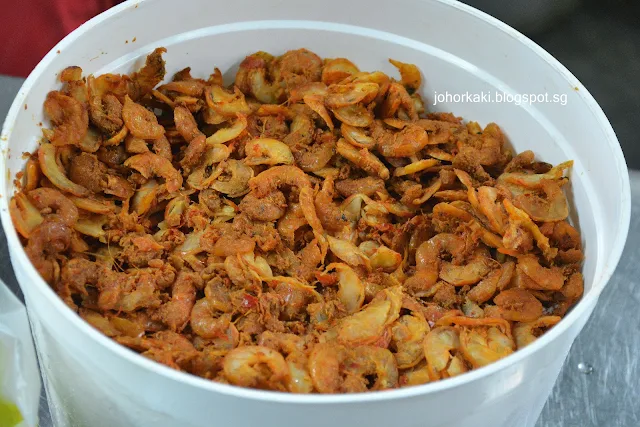
The tiny sua lor were there. Lots of it.

The pork slices were there. In good, generous sized slices.

We can add sio bak or roast belly pork to this Hokkien mee.

How about braised pork trotter or intestines? Pork ribs?
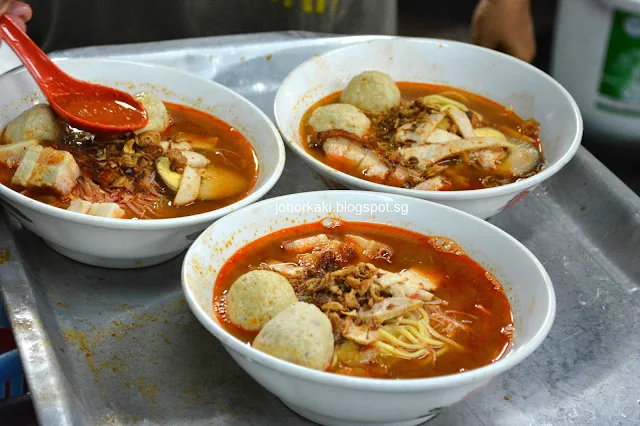
Here you can even get ping pong size fish balls to go with your Hokkien mee.

Our bowl of Penang Hokkien mee. We indulged in a little added on sio bak.

The soul of Hokkien mee is in it's prawny broth. At 三條路 888, the sweet and savoury broth rocks.

Second to the prawny broth, to me, the chili sauce is what sets Penang Hokkien mee apart from the versions in Johor and Singapore. The full bodied chili sauce has a sharp sting and is the ingredient that balances the savoury crustacean flavour in the broth.
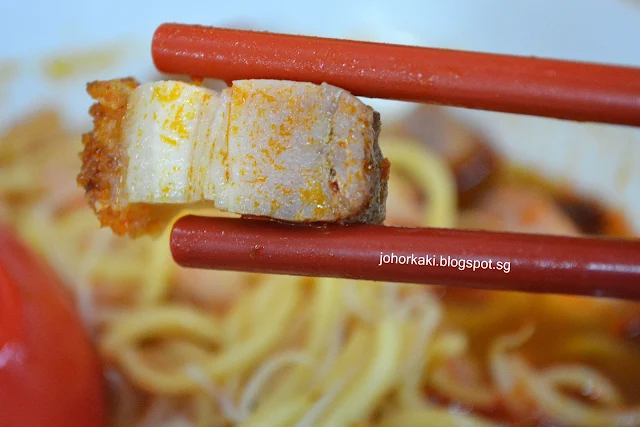
The sio bak was nice, but it was just nice to have. Personally, just the ordinary little prawns and skinny pork slices do fine :D

The boss was extremely busy, so we did not get to speak with her. Just a smile, quick hello and thank you, as we were leaving.
Acknowledgement: Original Century Food Pte Ltd, maker of MyOri Penang White Curry Noodles supported my visit to Penang and my mission to "Put Every Good Hawker on the World Wide Web".

Restaurant name: Lebuh Presgrave 888 Hokkien Mee 三條路888福建面
Address: Off Lebuh McNair, corner lot 67-A Lebuh Presgrave, Georgetown, Penang
GPS: 5.411001,100.330694
Hours: 4:30pm to 12:00 midnight (Closed on Thurs)
Non Halal
Date visited: 26 Oct 2014
Return to Johor Kaki homepage.
Air Itam Sisters Curry Mee • What is Penang White Curry Noodles?
✍ 28 Oct 2014 / Update 21 Jun 2025. By now, most of us have eaten the instant version, if not at least heard of, Penang White Curry Noodles, thanks to at least 25 brands of the instant noodle craze.
So, on my first trip to Penang (after 10 years), I told myself that I must taste some real Penang White Curry Noodles.
So, on my first trip to Penang (after 10 years), I told myself that I must taste some real Penang White Curry Noodles.
Ru Ji Kitchen Handmade Fish Ball Noodle in Holland Drive Hawker Centre Singapore 如记小厨

After my medical appointment at NUH this morning, I went over to Ghim Moh hawker centre for Guan Kee char kway teow. Again, the stall was closed - it has always been like this during the last few years. The last time I tasted Guan Kee CKT was some 20 years ago.
Anyway, I popped over to nearby Holland Drive hawker centre for Ru Ji Kitchen's fish ball noodles. It is always open, always honours its published hours. Ru Ji saved the day again for me as their fish ball noodle is always consistently good.
Crocodile Soup Recipe - Ultimate Hawker Fest 2014 Singapore - Return of the Crocodile King 鱷魚大王重出江湖
Once upon a time, long before Johor Kaki was born, there was a Crocodile Kingdom at Old Airport Road food centre in Singapore.
Last year, the Crocodile King went exploring, getting ready to return to his beloved kingdom with the best crocodile dishes for his dear people.
Then, he heard a call for help.
Singapore Touch Community is holding their annual charity food fair, the Ultimate Hawker Fest 2014, to raise funds to help 35,000 needy people under their care.
The Crocodile King has a soft heart, especially for needy people.
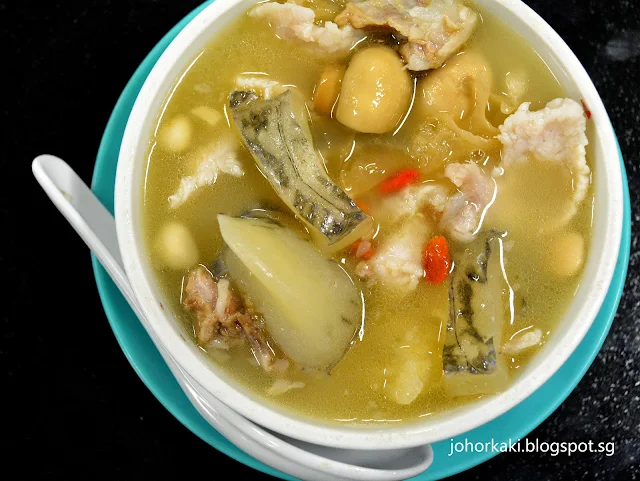
Without a second thought, the Crocodile King agreed to serve his Ultimate Herbal Crocodile Soup at the Ultimate Hawker Fest.

The Crocodile King Tony Tee was even kind enough to conduct a demonstration to show how he makes his Ultimate Herbal Crocodile Soup (venue at the courtesy of The Eureka Cooking Lab in Singapore).

The ingredients (clockwise from top left), dried snow fungus, Chinese wine (五加皮 and 紹興 blend), dried fish maw, herbs (pre-packed), and button mushrooms.

A closer look at the herbs. If the herbs look mysterious to you, relax. You can buy them pre-packed at supermarkets.
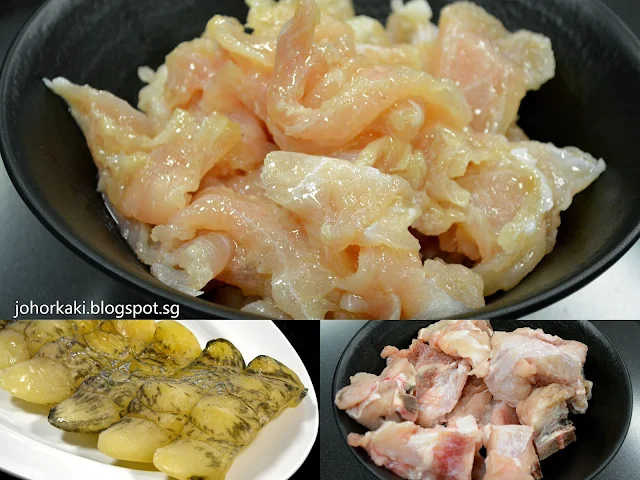
Clockwise, sliced crocodile tail meat marinated with sesame oil, crocodile loin bones and crocodile tail fin.

Closer look at the waggley tail.

The herbs, crocodile bones and tail fin were slowed cooked in a pot of water for six hours to make the broth.

Remove the floppy tail fin from the simmering pot and let it cool.

The croc tail fin which is 100% collagen gels on cooling, bringing the spring back to the tail fin softened by long boiling.

Tony snipped the croc tail fin into bite size pieces just before final cooking for serving.

Fast boil the croc tail fin, croc meat slices, dried fish maw pieces, fungus mushroom and canned button mushrooms in the crocodile broth just before serving.
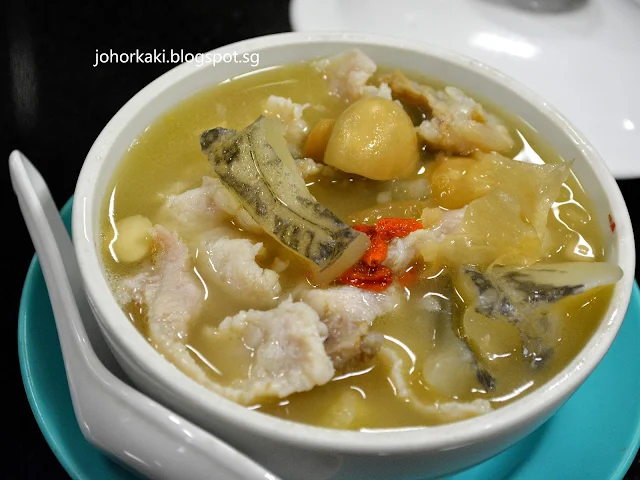
Voila!!
The Ultimate Herbal Crocodile Soup.
No kidding.
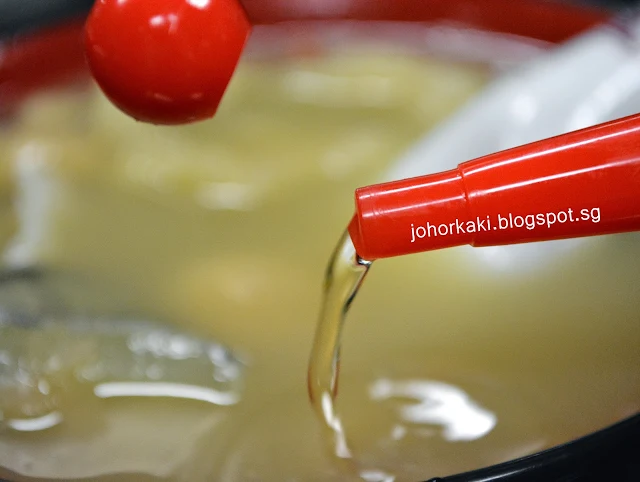
I indulged in a squirt of wu jia pi and shao xing 五加皮 and 紹興 blend :D

This is the most delicious herbal broth that I have had for a long time.
The broth had a smooth, round body, well balanced sweet and savoury flavours, very mild likable herbal taste, and a touch of old Chinese wine taste and aroma. There was hardly any grease at all.
Superb.

The gummy, jelly like tail fin. 100% natural collagen :D

The crocodile meat tasted like good fresh fish and had the texture of tender lean pork.
Crocodile King Tony Tee sharing with us the benefits of herbal crocodile soup. Check out the video for all the benefits of the tonic :D
I am always sceptical about people claiming themselves king of this, or princess of that. But, after tasting the Crocodile King's Ultimate Herbal Crocodile Soup today, I have to acknowledge that Tony is truly Your Royal Highness of the Crocodile Kingdom :D
I am already missing Tony's Ultimate Herbal Crocodile Soup.
I am looking forward to the Crocodile King's return, when the time is ripe.
Meanwhile, we have two options.
Option one.
Do it yourself. DIY.
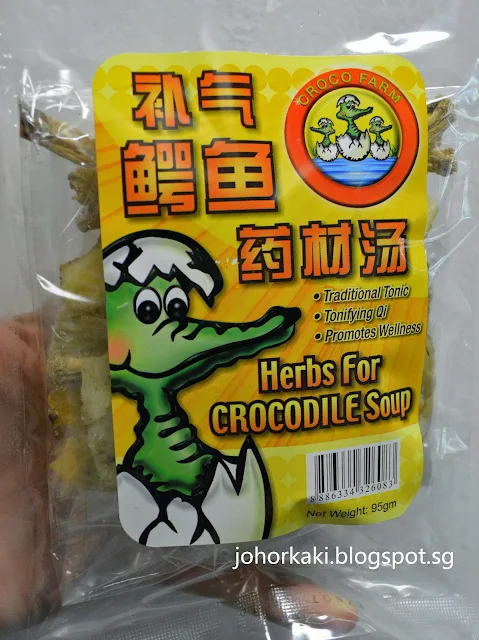
Tony said we can buy this pre-packed herbs and also crocodile meat and bones at supermakets. Just follow the instructions on the packet of herbs, and you will have good (not ultimate) herbal crocodile soup.
The second option, get the Ultimate version with the added bonus of meeting the Crocodile King 鱷魚大王 Tony Tee in person by visiting the charity Ultimate Hawker Fest 2014.
Date: 22 Nov 2014
Venue: SUNTEC Halls 401-402
Time: 11:00am to 5:00pm
Get your Singapore Ultimate Hawker Fest 2014 coupons here.
Either way, if you miss the good or Ultimate Herbal Crocodile Soup, you will regret it.
Return to Johor Kaki homepage.
Last year, the Crocodile King went exploring, getting ready to return to his beloved kingdom with the best crocodile dishes for his dear people.
Then, he heard a call for help.
Singapore Touch Community is holding their annual charity food fair, the Ultimate Hawker Fest 2014, to raise funds to help 35,000 needy people under their care.
The Crocodile King has a soft heart, especially for needy people.

Without a second thought, the Crocodile King agreed to serve his Ultimate Herbal Crocodile Soup at the Ultimate Hawker Fest.

The Crocodile King Tony Tee was even kind enough to conduct a demonstration to show how he makes his Ultimate Herbal Crocodile Soup (venue at the courtesy of The Eureka Cooking Lab in Singapore).

The ingredients (clockwise from top left), dried snow fungus, Chinese wine (五加皮 and 紹興 blend), dried fish maw, herbs (pre-packed), and button mushrooms.

A closer look at the herbs. If the herbs look mysterious to you, relax. You can buy them pre-packed at supermarkets.

Clockwise, sliced crocodile tail meat marinated with sesame oil, crocodile loin bones and crocodile tail fin.

Closer look at the waggley tail.

The herbs, crocodile bones and tail fin were slowed cooked in a pot of water for six hours to make the broth.

Remove the floppy tail fin from the simmering pot and let it cool.

The croc tail fin which is 100% collagen gels on cooling, bringing the spring back to the tail fin softened by long boiling.

Tony snipped the croc tail fin into bite size pieces just before final cooking for serving.

Fast boil the croc tail fin, croc meat slices, dried fish maw pieces, fungus mushroom and canned button mushrooms in the crocodile broth just before serving.

Voila!!
The Ultimate Herbal Crocodile Soup.
No kidding.

I indulged in a squirt of wu jia pi and shao xing 五加皮 and 紹興 blend :D

This is the most delicious herbal broth that I have had for a long time.
The broth had a smooth, round body, well balanced sweet and savoury flavours, very mild likable herbal taste, and a touch of old Chinese wine taste and aroma. There was hardly any grease at all.
Superb.

The gummy, jelly like tail fin. 100% natural collagen :D

The crocodile meat tasted like good fresh fish and had the texture of tender lean pork.
Crocodile King Tony Tee sharing with us the benefits of herbal crocodile soup. Check out the video for all the benefits of the tonic :D
I am always sceptical about people claiming themselves king of this, or princess of that. But, after tasting the Crocodile King's Ultimate Herbal Crocodile Soup today, I have to acknowledge that Tony is truly Your Royal Highness of the Crocodile Kingdom :D
I am already missing Tony's Ultimate Herbal Crocodile Soup.
I am looking forward to the Crocodile King's return, when the time is ripe.
Meanwhile, we have two options.
Option one.
Do it yourself. DIY.

Tony said we can buy this pre-packed herbs and also crocodile meat and bones at supermakets. Just follow the instructions on the packet of herbs, and you will have good (not ultimate) herbal crocodile soup.
The second option, get the Ultimate version with the added bonus of meeting the Crocodile King 鱷魚大王 Tony Tee in person by visiting the charity Ultimate Hawker Fest 2014.
Date: 22 Nov 2014
Venue: SUNTEC Halls 401-402
Time: 11:00am to 5:00pm
Get your Singapore Ultimate Hawker Fest 2014 coupons here.
Return to Johor Kaki homepage.
Makansutra Singapore 24 Hr Street Food Safari Tour - Prelude to World Street Food Congress 2015
I was drafted into Makansutra's 24 Hour Street Food Tour in Singapore. The official name is the more descriptive and dramatic 24H Street Food Frenzy Safari. It's wild and a world first. The groundbreaking 24 Hour food marathon was in conjunction with the coming World Street Food Congress which will be held in Singapore from 8 to 12 Apr 2015.
When K.F. Seetoh mentioned the crazy tour to me a few months ago, I jumped at the idea without a second thought or any idea what I was getting into. I just knew it was crazy, audacious, it was about good food, and I wouldn't want to miss it for anything.
Seetoh created and led the 24 hour tour for 50 media representatives from North America, Europe, Australia and Asia with his Makansutra team. Andrew Wong, Catherine Ling (of Camemberu blog) and myself were co-hosts.

Warning: This is a very long post. 24 hours is really very little time to showcase the breath and depth of Singapore's diverse street food and it's culture. But, here it is - a cross section of Singapore's best street food, personally handpicked by K.F. Seetoh, Singapore's makan (eat) guru.
I joined the 24 Hour Street Food Tour at Hill Street char kway teow stall located at Bedok South food centre. This is one of Singapore's best known CKT stalls, started in the 1960s at a food stall along Hill Street (hence the name).
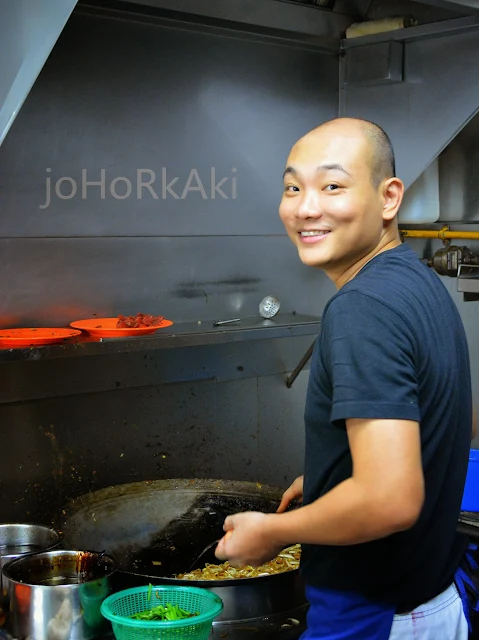
The young Mr. Ng (Ah Kiat) was manning the wok today at Hill Street char kway teow stall.
The founder, Ah Kiat's dad, is retired now. The huge crowd did not intimidate Ah Kiat at all, as long queues at his popular char kway teow stall is just another day at the office.

Ah Kiat's char kway teow was perfectly executed. Anthony Bourdain said it best when he declared this the tastiest ugly mass.
There was plenty of wok hei, and layers of savouriness from the lard, soy sauce, cockle blood and larb cheong (Cantonese waxed sausages) juices balanced with sweet sauce. The flavours were robust, though some felt it was a tad too sweet.
Texture was good too. Soft noodles with seared bits buried unpredictably here and there in the heap, enveloped in gooey flavoursome juices, punctuated with crunchy bean sprouts, chewy larb cheong, and tender blood cockles.
Our next stop was a short hop away at Bedok Food Centre.

This was my first taste of Mee Kuah Upeh at Mamu Kitchen in Bedok Food Centre.
The yellow noodles in the upeh leaf boat were fully submerged in a thick gravy of well balanced tangy, sweet and mildly spicy flavours. Holding the flavours together was an underlying seafood and mutton broth.
(Upeh is sun dried betel palm leaf.)
This mee kuah also comes with three fresh good sized shrimps.

The friendly owner of Mamu Kitchen enthusiastically explaining his signature Indian Muslim Mee Kuah Upeh dish.

From the same Bedok Food Centre, just stalls away, we had Cuttlefish Kang Kong from 夜來香 or Yue Lai Xiang (the famous 70 year old stall has no English signboard).
A local salad of crunchy fresh cucumber, pineapple, and greens mixed with gummy chewy cuttlefish and jellyfish tossed in a dark savoury sweet spicy sauce. Great mix of textures and tangy, sweet, savoury and spicy flavours. The bits of roughly crushed fried peanuts added nutty flavours and more crunch to the dish.
Hard to find outside of Singapore, and even here, this dish is slowly disappearing from food centres.

Cheng tng (known as cikong in Malaysia) also from 夜來香.
It was welcome relief from the robust tasting food and the humid tropical Singapore evening.
I drank up the whole bowl as the cold concoction was just mildly sweet (not overly sugary) and the jumble of refreshing ingredients inside had interesting soft textures and flavours. Some of the interesting ingredients were dried longan flesh, lotus seeds, dried persimmon, snow fungus, sago, gingko nuts, and strips of candied melon.
夜來香 has been around since 1939 (before World War II) and to many Singaporeans, it still serves the best cuttlefish kang kong and cheng tng on the island.

No Singapore food trail is complete without the iconic Singapore style chili crab which many consider is the island's National dish.
The Makansutra team brought the participants to Dragon Phoenix 龍鳳 for a taste of this Singapore icon.

The thick gravy was a blend of tangy, sweet and spicy. There were eggs in the gravy to give it body but the egginess was a little shy in the assertive presence of the tomato puree, onions and sambal chili.

The fresh Sri Lankan crabs were perfectly executed. The succulent flesh protected from the hot oil by the shell, stayed juicy, and refreshingly sweet and slightly briny.

Our next stop was Immigrants Gastrobar in trendy Joo Chiat.
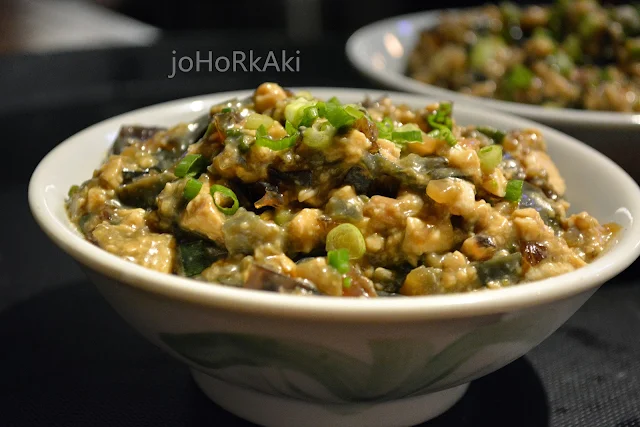
We had chilled tofu - a chilled mish mash of mushed tofu, premium century egg, crunchy diced pickles and chopped scallion held together by a sauce based on sesame oil. Didn't really worked for me but everyone around me, locals and visitors alike were raving about it.

We stopped at Candlenut restaurant for tasting portions of Ayam buah keluak or chicken cooked with black pulp hollowed out from an Indonesian black nut. Most of the visiting media were encountering the bitter, earthly, savoury flavour of this unique Peranakan (Straits Chinese) dish for the first time. Some were delighted and all were curious about how this black nut is prepared and enjoyed.

Candlenut's buah keluak ice cream is a world first. It's an interesting innovation but I need to taste it at least once more to appreciate it better. Right now, the sweetened bitter earthly taste didn't captivate me, let's say like my first taste of matcha ice cream or sesame seed ice cream did.

We arrived well behind schedule and well past Keng Eng Kee (KEK) restaurant's closing time. But, the entire clan waited to host us, all smiles and happy. All hands, founder and patriarch Liew Choy and his children Wayne, Paul, Geraldine were all on hand, preparing and explaining the dishes that the guests were enjoying.

Keng Eng Kee's Ming Zhu roll 明珠卷 created by the restaurant's matriarch. It was salted egg yolk, chopped black mushrooms, shrimp and egg wrapped in tofu skin and then deep fried.
The roll was expertly executed, so the skin was crispy but not greasy, while inside, the fillings were tender and moist. Some of the guests declared that Ming Zhu roll was their favourite dish of the day.

Coffee Pork Ribs.
When this dish was served, the air around the restaurant was perfumed with a sweet, rich Arabica (coffee) aroma.
I bet that if we take someone blindfolded to Keng Eng Kee when this dish dish is served, many would guess that s/he is in an espresso bar.

This Marmite Chicken was actually not one of the planned dishes for the visit.
But, conversation at our table with British and Hong Kong media somehow drifted to how the quintessentially British beef essence is used as a marinate in Singapore and Malaysia. The gracious host Liew Choy immediately asked Wayne to whip up three large plates to show the guests what is Marmite Chicken.
I take my hat off to Liew Choy for his outstanding hospitality.
Back to the Marmite Chicken.
What can I say?
It was simply brilliant! Perfectly executed with crispy savoury sweet batter outside wrapping a juicy succulent piece of chicken inside.
Everyone was impressed :D
KEK is consistently ranked among Singapore's top 5 Chinese zhi char restaurants by credible review panels and reputable food writers/ bloggers. I have absolutely no question about that.
Next stop was Singapore's far, far West.

Queueing at the legendary Power Nasi Lemak at Boon Lay Place Food Village.

I guess a staple dish well loved by all communities, good location, quick service, above average tasting food (everything was OK) and competitive pricing worked together to attract the long queues at Power Nasi Lemak.
The coconut rice was infused with aromatic coconut milk, and the grains had a soft, yet slightly nutty texture. The sambal chili was savoury, spicy and sweet. The fried chicken wings had a crispy, tasty rempah batter wrap while the flesh inside was tender, moist and juicy. The spice marinated Ikan Kuning had just the right texture and flavours.
Get the coconut rice, sambal chili, fried chicken wings and fried Kuning right and you have a winner of a power nasi lemak stall :D

Next stop, Makansutra Gluttons Bay. Opened in 2004 by Makansutra, the strategically located, popular food hub features fine Singapore street food curated by K.F. Seetoh.

Har Cheong Kai from Hong Kong Street Chun Kee stall.
Invented in 1960s Singapore, Har Cheong Kai is chicken wings marinated in fermented prawn paste batter and then deep fried. Generally similar in concept with the fried chicken wings at Power Nasi Lemak, each just using a different marinate.
Perfect beer food.

Banana fondue, K.F. Seetoh's invention.
Sliced banana wrapped in batter, fried and eaten with kaya (creamy coconut milk and egg jam) dip.
Layers of sweetness and soft textures.
Brilliant tea time snack.

Duck satay!
From Alhambra Padang Satay stall.
The meaty duck saturated with savoury sweet marinate were skewered with tiny wooden spears and expertly barbecued over slow charcoal fire.

If you come to Singapore, and you didn't try Sheila's juicy duck satay before going home, you ought to regret it :-D

After Glutton's Bay, the evil food lord herded the innocents to Singapore's red light district for their initiation to dark, back lane dining.
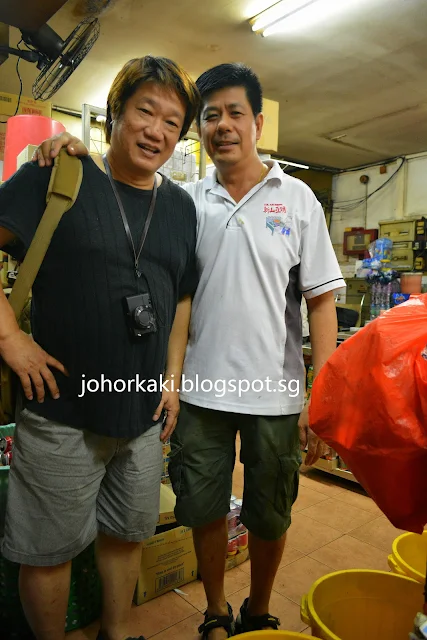
K.F. Seetoh with Johor's permanent food representative in Singapore, JB Ah Meng.

JB Ah Meng's signature Salted Egg Yolk Prawn Tempura 咸蛋黄炒虾球.
The thing that fascinated me most about this dish were the pop corns.
Pop corns that don't pop.
But, the sweet corn enveloped in a crispy salted egg yolk crust bursts savoury sweet aroma and flavour in the mouth.
It was love at first bite. But hey, I am not the only starry eyed one.
Three Michelin Star Chef Ferran Adrià was so taken in by this dish that he wanted to buy the recipe from Ah Meng there and then, on the spot. The owner of 3 Michelin Star, El Bulli, 5 times winner of the best restaurant in the world award wanted to make a deal with JB Ah Meng, right there at that dingy red light district back lane.
Many other celebrity chefs have dropped in on Ah Meng, including Anthony Bourdain who made a film here.

JB Ah Meng's signature fried ewww Eel skin 香炸鱼皮 with tangy spicy Thai style dip. Crispy like an al natural cracker.

Crispy fried lotus roots on a bed of snake beans 蛇豆炒莲藕.

Well executed stir fried la la mussels. Very clean, fresh, simple and very delicious.
The food at JB Ah Meng was so good, the guests were oblivious to the goings on around them in Singapore's colourful underbelly.
We next visited the Jurong Fish Port and Pasir Panjang Vegetable Wholesale Centre which gave us the much needed relief from the day's non stop eating :P

Next stop, Thasevi Food for their famous Jalan Kayu roti prata (known as roti canai in Malaysia).

To know if a stall is making good roti prata, take a look at the chef. How big can he spread the dough? The bigger they spread the flour dough, the more layers there will be when the dough is folded into a small "envelope". The more layers, the crispier the outside, and the fluffier the inside.
The best roti pratas are crispy outside and fluffy inside, and eaten with rich spicy curries of fish, chicken, mutton or just vegetables (mostly chickpeas).

夜來香 in Singapore's far north is an example of how Makansutra will track down good food to the ends of Singapore. When the food is good, no corner of the island is too far for Makansutra.
This laksa has the level of lemakness (coconut milk creaminess) to surpass any on this island. The creaminess somewhat muted the flavours of the spices and hae bee (dried shrimps). Scooping in a couple of dollops of sambal chili would help a little to rise it's spiciness. 夜來香 uses skinnier rice noodles which hold up better to boiling and soaking in broth better than their fatter, mushier cousins. Surely, one of the better laksa in Singapore.
I was not able to join the entire 24 Hr Street Food Trail. I manged about 70%. Here are those stalls/ restaurants which I didn't visit during the trail but I list them here for the benefit of readers.
Food on the 24 Hr Street Food Trail which I had eaten before (but not during the trail).

Chey Sua fried carrot cake 青山菜头粿.
Humble stall in Toa Payoh, one of Singapore's oldest satellite towns, well loved for their simple fried carrot cake dish. There are various versions of this dish - black (with savoury sweet soy sauce), white (without soy sauce), with/ without egg, and so on. Here at Chey Sua, the carrot cakes are cut into tiny pieces and fried with egg, crunchy diced chai po (preserved raddish) and served flattened almost like a pancake.
Soft, moist, savoury sweet and eggy with a slightly crisp outside. Interesting textures and flavours but I can't really detect the carrots.


Rong Cheng Bak Kut Teh is famed for their prime pork rib version of this popular dish. Rong Cheng's BKT is cooked in the Teochew style which uses only pepper and garlic to cook the prime ribs in water. This style of BKT pioneered by Rong Cheng in the 1970s is uniquely Singapore.

Tian Tian Chicken Rice 天天海南雞飯 is a good representative of a staple dish found in every coffee shop and food center, in every corner of Singapore. Nowadays made with standard American broilers weighing over 2 kilos each, the chicken meat is tender, succulent but short on "chickeny" flavour. All chicken rice stalls using American broilers face this issue.
The key to Tian Tian's popularity is their unique blend of savoury, sweet, velvety, syrupy texture sauce. The bland American broiler flesh becomes delicious when bathed in Tian Tian's special sauce.
There you have it.
The world's first 24 Hour Food Tour.
Want to know how great this tour is? Gather a few family and friends, and try this yourself.
You will be glad you took up the 24 Hour challenge :-D
List of all the shops and stalls on the 24 Hour Street Food Trail.
Restaurant name: Tian Tian Hainanese Chicken Rice 天天海南雞飯
Address: #01-10/11 Maxwell Food Centre, Maxwell Road, Singapore
Map: http://goo.gl/maps/TQZZC
GPS: 1.280412,103.844286
Hours: 11:00am to 8:00pm (Closed on Monday)
Restaurant name: Hill Street Fried Kway Teow stall 禧街炒粿条
Address: Blk 16 Bedok South Road #01-187 Bedok South Market and Food Centre
Map: http://goo.gl/maps/XVWLt
GPS: 1.32057,103.93589
Hours: Tues to Sun 10:30am to 5:30pm (Closed on Monday)
Restaurant name: Mamu Kitchen
Address: Bedok Food Centre, Blk 1 Bedok Road, #25, Singapore
Map: http://goo.gl/maps/l6tZT
GPS: 1.320259,103.955855
Hours: 5:00pm to 12:00 midnight
Restaurant name: 夜來香 Cuttlefish Kang Kong and Cheng Tng
Address: Bedok Food Centre, Blk 1 Bedok Road, #31 & 32, Singapore
Map: http://goo.gl/maps/l6tZT
GPS: 1.320259,103.955855
Hours: 11:30am to 8:30pm
Restaurant name: Dragon Phoenix Restaurant (Novotel Clarke Quay) 龙凤大饭店
Address: #06-00, Novotel Clarke Quay, 177A River Valley Road, Singapore
Map: http://goo.gl/maps/4b81d
GPS: 1.291277,103.844082
Hours: Mon - Sat: 11:00am - 3:00pm | Mon - Sat: 6:00pm - 11:00pm | Sun: 10:00am - 3:00pm and 6:00pm - 11:00pm
Restaurant name: Immigrants Gastrobar
Address: 467, Joo Chiat Rd, Singapore
Map: http://goo.gl/maps/FJuAV
GPS: 1.307790,103.903565
Hours: 5:00pm to 12:00 midnight
Restaurant name: Candlenut
Address: 331 New Bridge Road, New Bridge Rd, Singapore
Map: http://goo.gl/maps/2eQkP
GPS: 1.279508,103.839763
Hours: 12:00pm to 2:30pm, 6:00pm to 10:00pm
Restaurant name: Keng Eng Kee Seafood Restaurant 琼荣记海鲜
Address: #01-136, 124 Bukit Merah Lane 1, Singapore
Map: http://goo.gl/maps/5lA4R
GPS: 1.285598,103.803752
Hours: 11:00am to 2:00pm | 5:00pm to 11:00pm
Tel: (+65) 6272 1038
Restaurant name: Boon Lay Power Nasi Lemak
Address: #01-06, Boon Lay Place Market and Food Centre, 221 Boon Lay Place, Singapore
Map: http://goo.gl/maps/cqxod
GPS: 1.345736,103.713332
Hours: 5:00pm to 4:00am
Restaurant name: Makansutra Gluttons Bay
Address: 8 Raffles Ave #01-15, Singapore
Map: http://goo.gl/maps/61mNF
GPS: 1.289727,103.856656
Hours: 5:00pm to 2:00am
Restaurant name: JB Ah Meng 新山亚明小厨
Address: 2, Lorong 23, Geylang, Singapore
Map: http://goo.gl/maps/5MpY8
GPS: 1.313384,103.881472
Hours: 5:00pm to 4:00am
Restaurant name: Thasevi Food
Address: 239 Jalan Kayu, Singapore
Map: http://goo.gl/maps/8gPiF
GPS: 1.396509,103.872932
Hours: 24 Hours
Restaurant name: Ye Lai Xiang Laksa 夜來香
Address: Blk 4A, Woodlands Centre Road Food Centre, Singapore
Map: http://goo.gl/maps/0Oyhf
GPS: 1.441068,103.769975
Hours: 3:00am to 3:00pm (Closed on Thurs)
Restaurant name: Rong Cheng (Sin Ming Road) Bak Kut Teh 榕城(新民路)肉骨茶
Address: Blk 26, Sin Ming Lane #01-117, Midview City, Singapore
Map: http://goo.gl/maps/DgcCA
GPS: 1.359301,103.834630
Hours: 7:00am to 9:00pm
Restaurant name: Chey Sua Carrot Cake 青山菜头粿
Address: Toa Payoh West Market & Food Centre, 127 Lorong 1, Toa Payoh, #02-30
Map: http://goo.gl/maps/8OUcc
GPS: 1.338324,103.844573
Hours: 7:00am to 1:00pm (Closed on Monday)
Restaurant name: Hajjah Mona Nasi Padang
Address: #02-166, Geylang Serai Market and Food Centre, 1 Geylang Serai, Sinagpore
Map: http://goo.gl/maps/qm3P2
GPS: 1.316784,103.897517
Hours: 8:00am to 7:00pm (Closed on Weds)
Restaurant name: Fishball Story 鱼缘
Address: 505 Beach Road, #01-85 Golden Mile Food Centre, Singapore
Map: http://goo.gl/maps/rupai
GPS: 1.302835,103.864037
Hours: 10:30am to 5:00pm
This 24 Hour Street Food Trail is created by Makansutra and was first conducted on 18 to 19 Oct 2014.
Return to Johor Kaki homepage.
When K.F. Seetoh mentioned the crazy tour to me a few months ago, I jumped at the idea without a second thought or any idea what I was getting into. I just knew it was crazy, audacious, it was about good food, and I wouldn't want to miss it for anything.
Seetoh created and led the 24 hour tour for 50 media representatives from North America, Europe, Australia and Asia with his Makansutra team. Andrew Wong, Catherine Ling (of Camemberu blog) and myself were co-hosts.

Warning: This is a very long post. 24 hours is really very little time to showcase the breath and depth of Singapore's diverse street food and it's culture. But, here it is - a cross section of Singapore's best street food, personally handpicked by K.F. Seetoh, Singapore's makan (eat) guru.
I joined the 24 Hour Street Food Tour at Hill Street char kway teow stall located at Bedok South food centre. This is one of Singapore's best known CKT stalls, started in the 1960s at a food stall along Hill Street (hence the name).

The young Mr. Ng (Ah Kiat) was manning the wok today at Hill Street char kway teow stall.
The founder, Ah Kiat's dad, is retired now. The huge crowd did not intimidate Ah Kiat at all, as long queues at his popular char kway teow stall is just another day at the office.

Ah Kiat's char kway teow was perfectly executed. Anthony Bourdain said it best when he declared this the tastiest ugly mass.
There was plenty of wok hei, and layers of savouriness from the lard, soy sauce, cockle blood and larb cheong (Cantonese waxed sausages) juices balanced with sweet sauce. The flavours were robust, though some felt it was a tad too sweet.
Texture was good too. Soft noodles with seared bits buried unpredictably here and there in the heap, enveloped in gooey flavoursome juices, punctuated with crunchy bean sprouts, chewy larb cheong, and tender blood cockles.
Our next stop was a short hop away at Bedok Food Centre.

This was my first taste of Mee Kuah Upeh at Mamu Kitchen in Bedok Food Centre.
The yellow noodles in the upeh leaf boat were fully submerged in a thick gravy of well balanced tangy, sweet and mildly spicy flavours. Holding the flavours together was an underlying seafood and mutton broth.
(Upeh is sun dried betel palm leaf.)
This mee kuah also comes with three fresh good sized shrimps.

The friendly owner of Mamu Kitchen enthusiastically explaining his signature Indian Muslim Mee Kuah Upeh dish.

From the same Bedok Food Centre, just stalls away, we had Cuttlefish Kang Kong from 夜來香 or Yue Lai Xiang (the famous 70 year old stall has no English signboard).
A local salad of crunchy fresh cucumber, pineapple, and greens mixed with gummy chewy cuttlefish and jellyfish tossed in a dark savoury sweet spicy sauce. Great mix of textures and tangy, sweet, savoury and spicy flavours. The bits of roughly crushed fried peanuts added nutty flavours and more crunch to the dish.
Hard to find outside of Singapore, and even here, this dish is slowly disappearing from food centres.

Cheng tng (known as cikong in Malaysia) also from 夜來香.
It was welcome relief from the robust tasting food and the humid tropical Singapore evening.
I drank up the whole bowl as the cold concoction was just mildly sweet (not overly sugary) and the jumble of refreshing ingredients inside had interesting soft textures and flavours. Some of the interesting ingredients were dried longan flesh, lotus seeds, dried persimmon, snow fungus, sago, gingko nuts, and strips of candied melon.
夜來香 has been around since 1939 (before World War II) and to many Singaporeans, it still serves the best cuttlefish kang kong and cheng tng on the island.

No Singapore food trail is complete without the iconic Singapore style chili crab which many consider is the island's National dish.
The Makansutra team brought the participants to Dragon Phoenix 龍鳳 for a taste of this Singapore icon.

The thick gravy was a blend of tangy, sweet and spicy. There were eggs in the gravy to give it body but the egginess was a little shy in the assertive presence of the tomato puree, onions and sambal chili.

The fresh Sri Lankan crabs were perfectly executed. The succulent flesh protected from the hot oil by the shell, stayed juicy, and refreshingly sweet and slightly briny.

Our next stop was Immigrants Gastrobar in trendy Joo Chiat.

We had chilled tofu - a chilled mish mash of mushed tofu, premium century egg, crunchy diced pickles and chopped scallion held together by a sauce based on sesame oil. Didn't really worked for me but everyone around me, locals and visitors alike were raving about it.

We stopped at Candlenut restaurant for tasting portions of Ayam buah keluak or chicken cooked with black pulp hollowed out from an Indonesian black nut. Most of the visiting media were encountering the bitter, earthly, savoury flavour of this unique Peranakan (Straits Chinese) dish for the first time. Some were delighted and all were curious about how this black nut is prepared and enjoyed.

Candlenut's buah keluak ice cream is a world first. It's an interesting innovation but I need to taste it at least once more to appreciate it better. Right now, the sweetened bitter earthly taste didn't captivate me, let's say like my first taste of matcha ice cream or sesame seed ice cream did.

We arrived well behind schedule and well past Keng Eng Kee (KEK) restaurant's closing time. But, the entire clan waited to host us, all smiles and happy. All hands, founder and patriarch Liew Choy and his children Wayne, Paul, Geraldine were all on hand, preparing and explaining the dishes that the guests were enjoying.

Keng Eng Kee's Ming Zhu roll 明珠卷 created by the restaurant's matriarch. It was salted egg yolk, chopped black mushrooms, shrimp and egg wrapped in tofu skin and then deep fried.
The roll was expertly executed, so the skin was crispy but not greasy, while inside, the fillings were tender and moist. Some of the guests declared that Ming Zhu roll was their favourite dish of the day.

Coffee Pork Ribs.
When this dish was served, the air around the restaurant was perfumed with a sweet, rich Arabica (coffee) aroma.
I bet that if we take someone blindfolded to Keng Eng Kee when this dish dish is served, many would guess that s/he is in an espresso bar.

This Marmite Chicken was actually not one of the planned dishes for the visit.
But, conversation at our table with British and Hong Kong media somehow drifted to how the quintessentially British beef essence is used as a marinate in Singapore and Malaysia. The gracious host Liew Choy immediately asked Wayne to whip up three large plates to show the guests what is Marmite Chicken.
I take my hat off to Liew Choy for his outstanding hospitality.
Back to the Marmite Chicken.
What can I say?
It was simply brilliant! Perfectly executed with crispy savoury sweet batter outside wrapping a juicy succulent piece of chicken inside.
Everyone was impressed :D
KEK is consistently ranked among Singapore's top 5 Chinese zhi char restaurants by credible review panels and reputable food writers/ bloggers. I have absolutely no question about that.
Next stop was Singapore's far, far West.

Queueing at the legendary Power Nasi Lemak at Boon Lay Place Food Village.

I guess a staple dish well loved by all communities, good location, quick service, above average tasting food (everything was OK) and competitive pricing worked together to attract the long queues at Power Nasi Lemak.
The coconut rice was infused with aromatic coconut milk, and the grains had a soft, yet slightly nutty texture. The sambal chili was savoury, spicy and sweet. The fried chicken wings had a crispy, tasty rempah batter wrap while the flesh inside was tender, moist and juicy. The spice marinated Ikan Kuning had just the right texture and flavours.
Get the coconut rice, sambal chili, fried chicken wings and fried Kuning right and you have a winner of a power nasi lemak stall :D

Next stop, Makansutra Gluttons Bay. Opened in 2004 by Makansutra, the strategically located, popular food hub features fine Singapore street food curated by K.F. Seetoh.

Har Cheong Kai from Hong Kong Street Chun Kee stall.
Invented in 1960s Singapore, Har Cheong Kai is chicken wings marinated in fermented prawn paste batter and then deep fried. Generally similar in concept with the fried chicken wings at Power Nasi Lemak, each just using a different marinate.
Perfect beer food.

Banana fondue, K.F. Seetoh's invention.
Sliced banana wrapped in batter, fried and eaten with kaya (creamy coconut milk and egg jam) dip.
Layers of sweetness and soft textures.
Brilliant tea time snack.

Duck satay!
From Alhambra Padang Satay stall.
The meaty duck saturated with savoury sweet marinate were skewered with tiny wooden spears and expertly barbecued over slow charcoal fire.

If you come to Singapore, and you didn't try Sheila's juicy duck satay before going home, you ought to regret it :-D

After Glutton's Bay, the evil food lord herded the innocents to Singapore's red light district for their initiation to dark, back lane dining.

K.F. Seetoh with Johor's permanent food representative in Singapore, JB Ah Meng.

JB Ah Meng's signature Salted Egg Yolk Prawn Tempura 咸蛋黄炒虾球.
The thing that fascinated me most about this dish were the pop corns.
Pop corns that don't pop.
But, the sweet corn enveloped in a crispy salted egg yolk crust bursts savoury sweet aroma and flavour in the mouth.
It was love at first bite. But hey, I am not the only starry eyed one.
Three Michelin Star Chef Ferran Adrià was so taken in by this dish that he wanted to buy the recipe from Ah Meng there and then, on the spot. The owner of 3 Michelin Star, El Bulli, 5 times winner of the best restaurant in the world award wanted to make a deal with JB Ah Meng, right there at that dingy red light district back lane.
Many other celebrity chefs have dropped in on Ah Meng, including Anthony Bourdain who made a film here.

JB Ah Meng's signature fried ewww Eel skin 香炸鱼皮 with tangy spicy Thai style dip. Crispy like an al natural cracker.

Crispy fried lotus roots on a bed of snake beans 蛇豆炒莲藕.

Well executed stir fried la la mussels. Very clean, fresh, simple and very delicious.
The food at JB Ah Meng was so good, the guests were oblivious to the goings on around them in Singapore's colourful underbelly.
We next visited the Jurong Fish Port and Pasir Panjang Vegetable Wholesale Centre which gave us the much needed relief from the day's non stop eating :P

Next stop, Thasevi Food for their famous Jalan Kayu roti prata (known as roti canai in Malaysia).

To know if a stall is making good roti prata, take a look at the chef. How big can he spread the dough? The bigger they spread the flour dough, the more layers there will be when the dough is folded into a small "envelope". The more layers, the crispier the outside, and the fluffier the inside.
The best roti pratas are crispy outside and fluffy inside, and eaten with rich spicy curries of fish, chicken, mutton or just vegetables (mostly chickpeas).

夜來香 in Singapore's far north is an example of how Makansutra will track down good food to the ends of Singapore. When the food is good, no corner of the island is too far for Makansutra.
This laksa has the level of lemakness (coconut milk creaminess) to surpass any on this island. The creaminess somewhat muted the flavours of the spices and hae bee (dried shrimps). Scooping in a couple of dollops of sambal chili would help a little to rise it's spiciness. 夜來香 uses skinnier rice noodles which hold up better to boiling and soaking in broth better than their fatter, mushier cousins. Surely, one of the better laksa in Singapore.
I was not able to join the entire 24 Hr Street Food Trail. I manged about 70%. Here are those stalls/ restaurants which I didn't visit during the trail but I list them here for the benefit of readers.
Food on the 24 Hr Street Food Trail which I had eaten before (but not during the trail).

Chey Sua fried carrot cake 青山菜头粿.
Humble stall in Toa Payoh, one of Singapore's oldest satellite towns, well loved for their simple fried carrot cake dish. There are various versions of this dish - black (with savoury sweet soy sauce), white (without soy sauce), with/ without egg, and so on. Here at Chey Sua, the carrot cakes are cut into tiny pieces and fried with egg, crunchy diced chai po (preserved raddish) and served flattened almost like a pancake.
Soft, moist, savoury sweet and eggy with a slightly crisp outside. Interesting textures and flavours but I can't really detect the carrots.


Rong Cheng Bak Kut Teh is famed for their prime pork rib version of this popular dish. Rong Cheng's BKT is cooked in the Teochew style which uses only pepper and garlic to cook the prime ribs in water. This style of BKT pioneered by Rong Cheng in the 1970s is uniquely Singapore.

Tian Tian Chicken Rice 天天海南雞飯 is a good representative of a staple dish found in every coffee shop and food center, in every corner of Singapore. Nowadays made with standard American broilers weighing over 2 kilos each, the chicken meat is tender, succulent but short on "chickeny" flavour. All chicken rice stalls using American broilers face this issue.
The key to Tian Tian's popularity is their unique blend of savoury, sweet, velvety, syrupy texture sauce. The bland American broiler flesh becomes delicious when bathed in Tian Tian's special sauce.
There you have it.
The world's first 24 Hour Food Tour.
Want to know how great this tour is? Gather a few family and friends, and try this yourself.
You will be glad you took up the 24 Hour challenge :-D
List of all the shops and stalls on the 24 Hour Street Food Trail.
Restaurant name: Tian Tian Hainanese Chicken Rice 天天海南雞飯
Address: #01-10/11 Maxwell Food Centre, Maxwell Road, Singapore
Map: http://goo.gl/maps/TQZZC
GPS: 1.280412,103.844286
Hours: 11:00am to 8:00pm (Closed on Monday)
Restaurant name: Hill Street Fried Kway Teow stall 禧街炒粿条
Address: Blk 16 Bedok South Road #01-187 Bedok South Market and Food Centre
Map: http://goo.gl/maps/XVWLt
GPS: 1.32057,103.93589
Hours: Tues to Sun 10:30am to 5:30pm (Closed on Monday)
Restaurant name: Mamu Kitchen
Address: Bedok Food Centre, Blk 1 Bedok Road, #25, Singapore
Map: http://goo.gl/maps/l6tZT
GPS: 1.320259,103.955855
Hours: 5:00pm to 12:00 midnight
Restaurant name: 夜來香 Cuttlefish Kang Kong and Cheng Tng
Address: Bedok Food Centre, Blk 1 Bedok Road, #31 & 32, Singapore
Map: http://goo.gl/maps/l6tZT
GPS: 1.320259,103.955855
Hours: 11:30am to 8:30pm
Restaurant name: Dragon Phoenix Restaurant (Novotel Clarke Quay) 龙凤大饭店
Address: #06-00, Novotel Clarke Quay, 177A River Valley Road, Singapore
Map: http://goo.gl/maps/4b81d
GPS: 1.291277,103.844082
Hours: Mon - Sat: 11:00am - 3:00pm | Mon - Sat: 6:00pm - 11:00pm | Sun: 10:00am - 3:00pm and 6:00pm - 11:00pm
Restaurant name: Immigrants Gastrobar
Address: 467, Joo Chiat Rd, Singapore
Map: http://goo.gl/maps/FJuAV
GPS: 1.307790,103.903565
Hours: 5:00pm to 12:00 midnight
Restaurant name: Candlenut
Address: 331 New Bridge Road, New Bridge Rd, Singapore
Map: http://goo.gl/maps/2eQkP
GPS: 1.279508,103.839763
Hours: 12:00pm to 2:30pm, 6:00pm to 10:00pm
Restaurant name: Keng Eng Kee Seafood Restaurant 琼荣记海鲜
Address: #01-136, 124 Bukit Merah Lane 1, Singapore
Map: http://goo.gl/maps/5lA4R
GPS: 1.285598,103.803752
Hours: 11:00am to 2:00pm | 5:00pm to 11:00pm
Tel: (+65) 6272 1038
Restaurant name: Boon Lay Power Nasi Lemak
Address: #01-06, Boon Lay Place Market and Food Centre, 221 Boon Lay Place, Singapore
Map: http://goo.gl/maps/cqxod
GPS: 1.345736,103.713332
Hours: 5:00pm to 4:00am
Restaurant name: Makansutra Gluttons Bay
Address: 8 Raffles Ave #01-15, Singapore
Map: http://goo.gl/maps/61mNF
GPS: 1.289727,103.856656
Hours: 5:00pm to 2:00am
Restaurant name: JB Ah Meng 新山亚明小厨
Address: 2, Lorong 23, Geylang, Singapore
Map: http://goo.gl/maps/5MpY8
GPS: 1.313384,103.881472
Hours: 5:00pm to 4:00am
Restaurant name: Thasevi Food
Address: 239 Jalan Kayu, Singapore
Map: http://goo.gl/maps/8gPiF
GPS: 1.396509,103.872932
Hours: 24 Hours
Restaurant name: Ye Lai Xiang Laksa 夜來香
Address: Blk 4A, Woodlands Centre Road Food Centre, Singapore
Map: http://goo.gl/maps/0Oyhf
GPS: 1.441068,103.769975
Hours: 3:00am to 3:00pm (Closed on Thurs)
Restaurant name: Rong Cheng (Sin Ming Road) Bak Kut Teh 榕城(新民路)肉骨茶
Address: Blk 26, Sin Ming Lane #01-117, Midview City, Singapore
Map: http://goo.gl/maps/DgcCA
GPS: 1.359301,103.834630
Hours: 7:00am to 9:00pm
Restaurant name: Chey Sua Carrot Cake 青山菜头粿
Address: Toa Payoh West Market & Food Centre, 127 Lorong 1, Toa Payoh, #02-30
Map: http://goo.gl/maps/8OUcc
GPS: 1.338324,103.844573
Hours: 7:00am to 1:00pm (Closed on Monday)
Restaurant name: Hajjah Mona Nasi Padang
Address: #02-166, Geylang Serai Market and Food Centre, 1 Geylang Serai, Sinagpore
Map: http://goo.gl/maps/qm3P2
GPS: 1.316784,103.897517
Hours: 8:00am to 7:00pm (Closed on Weds)
Restaurant name: Fishball Story 鱼缘
Address: 505 Beach Road, #01-85 Golden Mile Food Centre, Singapore
Map: http://goo.gl/maps/rupai
GPS: 1.302835,103.864037
Hours: 10:30am to 5:00pm
This 24 Hour Street Food Trail is created by Makansutra and was first conducted on 18 to 19 Oct 2014.
Return to Johor Kaki homepage.

